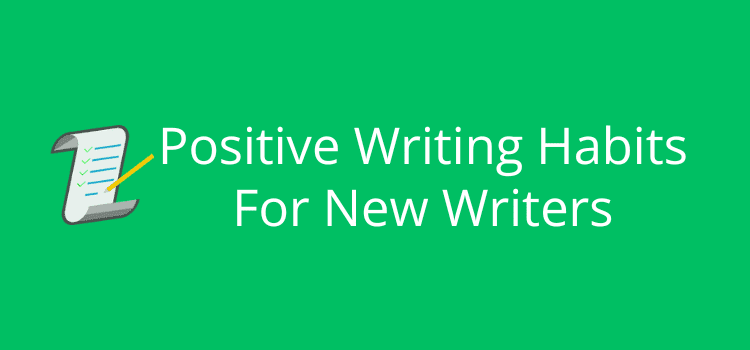
Developing positive writing habits can help you stay focused, motivated, and balanced, especially if you’re a new writer.
It can be surprising to discover that creative writing isn’t always smooth or structured. In fact, it’s often messy, unpredictable, and full of detours. One day, the words flow. The next day, you’re staring at a blinking cursor.
Writing is like a journey, which can have multiple destinations or even dead ends. Learning to write well is a process littered with mistakes, potholes in the road, and obstacles.
That’s why your writing routines and habits make a difference. They help bring order to the chaos and help you keep moving forward.
Developing your positive writing habits
No two writers are the same, so suggesting a set of strict goals or ground rules for new writers is pointless.
However, over the years, I found many different ways to improve, experiment, and maintain my output.
When I started writing, I always used a pencil and a notebook because they were the only tools I had.
I tried using a typewriter, but I couldn’t type well or fast, so it was a waste of time. My pencil and eraser were faster.
But I happily accepted progress when computers appeared on the scene.
Okay, that information gives my age away. But when I look back, my basic writing habits haven’t changed very much over the years.
Even when time was scarce for me to write, I still followed a basic pattern.
My mornings, when I’m fresh and alert, are for editing, revising, and proofreading. My writing time is generally in the afternoon, and the evening is my reading time.
It might not sound like groundbreaking information. But dividing my day into defined parts gives me a routine and set of habits that work well.
Yes, there’s more to it than that. If you’re new to writing, here are ten ideas you might consider adopting.
1. Start with small, achievable projects
Your aim might be to write books or long opinion essays for newspapers. However, whatever your end goal may be, start small.
My first venture into writing, aside from assignments given by my school teachers, was writing song lyrics.
While I didn’t become a famous songwriter, I learned to shape, change, modify, and rewrite phrases and sentences to fit the melody.
In other words, it forced me to learn how to use a variety of vocabulary and grammar structures. Writing poetry is similar.
Setting yourself projects that you can write quite quickly will help you develop your writing skills.
Short stories, blog posts, or social media entries are terrific starting points for a new writer.
2. Read a lot about writing
You often read writing advice articles telling you that you should read a lot.
Yes, reading books related to the type or style of writing that interests you can help.
But I find it more useful to read advice from writers.
We’re so lucky today to have an unlimited resource of writing help online.
I’ve been writing for a long time, but I never stop learning or being curious.
Writing often poses many questions, so finding answers can only help you to improve your skills and knowledge.
Always be inquisitive and ready to learn more.
3. Create your distraction-free writing space

Writers are not loners, but writing requires concentration. You don’t want to be interrupted every five minutes.
Find a place where you won’t be disturbed. It’s not always easy, especially if you’re in a family.
But you could try your garden, balcony, terrace, loft, attic, a local café, or a park bench.
Perhaps you might decide on two or three places you could use, depending on the weather or other circumstances.
I’m fortunate to have a quiet balcony with a wonderful view, so it’s an easy choice.
4. Set your writing schedule that works for you
You’ve got a busy life to lead, and writing can only be a part of it.
I mentioned before that I usually write in the afternoon. But it’s up to you to decide when you have the time to write.
Whenever it is, try to make it a daily routine and habit. Even if it’s only half an hour early in the morning, try to stick to it.
It’s one of the best positive writing habits you can create because it trains you to make writing part of your daily life.
5. Cut out or reduce distractions

Very few writers use a pen and paper now. Most use a computer and a word processor.
The good thing is that you can edit and correct your writing easily and instantly save it.
But a computer has many more uses, and most of them can distract you during your writing time.
The best approach is to close all other applications, turn off the Wi-Fi, and limit any other reminders.
All you want to use is your word processor and your imagination.
6. Experiment to improve your writing
It’s fun to take a short text and change it.
Perhaps you have a short story that you wrote in the standard form, using the past tense and third-person point of view.
Why not set yourself a fun writing challenge to change it into the present tense?
Or if you have an article or essay you wrote in the first person, rewrite it using the second person.
Another idea is to write a poem about one of your short stories.
Adapting, changing, and modifying are great ways to learn how to use a range of literary devices in your writing.
7. Mistakes are always part of the process
You can always fix a text, but you can’t fix a blank page.
When you write, don’t think about it, just write.
Spelling mistakes, grammar errors, and typos are easy to correct later in the process.
The critical ingredient is getting your ideas, thoughts, and imagination into words.
Do that first, and don’t worry about mistakes.
8. Ask questions to seek advice
If you’re not sure about something, ask.
It’s not easy now to find people online to read and give you feedback on your writing. Finding a local writing group is a better idea if you want peer reviews of your writing.
However, many people are happy to answer questions online.
You can use social media, comments on writing blog posts, or try Quora or Reddit.
But keep your questions short and to the point.
It’s also an excellent way to help you network with other writers.
9. Learn to proofread meticulously

When you finish writing and editing any text, it’s time to proofread.
It’s not a quick process and is far more than simply reading the text.
Analyze every word carefully and ensure that everything fits together in a coherent way.
Yes, you will probably find a few errors, but the essential part of proofreading is to make sure the text is logical, organized, and clear.
10. Never give up on your goals
The world needs new writers, so there’s a path for you to follow no matter what you want to write.
But it’s a tough road and not the easiest of dreams to fulfill.
All you can do is keep moving forward, improve your writing skills, look for opportunities, and, most of all, continue writing.
You will have a lot of ups and downs along the way.
But try to enjoy your little successes and accept and learn from the failures.
Summary
You have to want to be a writer.
But you won’t find many job vacancies seeking full-time writers.
You have to make your own way and at your speed, and the best way to achieve it is to set yourself positive and productive writing habits and achievable goals.
As per my habit, I’m writing the last words of this article late in the afternoon.
But come the morning, I’ll edit, correct, and try to add the last polishing touches to it.
I’ll leave proofreading for the following morning, and then I usually try to publish my articles before noon.
Yes, it takes me a few days to get from writing to publishing.
But it’s not a race, and that’s a good habit to adopt for new writers. Take your time, and only publish when you are sure your writing is perfect.
As for successes and failures, I’ve had many more of the second than the first.
But I take satisfaction from knowing that a couple of thousand people, or more sometimes, from all around the world visit this site every day to read my writing.
That’s more than enough success for me, and it keeps me well and truly motivated and in a routine.
Related Reading: How To Use Your Experience And Expertise In Articles
Share This Article


